Not only is there variations across surveys of different groups, there are variations across groups within households.
Figure 1: One year ahead CPI inflation median expected from Survey of Professional Forecasters (blue +), median expected from Michigan Survey of Consumers FINAL (red), median from NY Fed Survey of Consumer Expectations (light green), mean from Coibion-Gorodnichenko firm expectations survey [light blue squares], all in %. Michigan January inflation expectations prelminary. NBER defined peak-to-trough recession dates shaded gray. Red dashed line at expanded Russian invasion of Ukraine. Source: University of Michigan via FRED and Philadelphia Fed Survey of Professional Forecasters, NY Fed, and Coibion and Gorodnichenko, and NBER.
As noted before, expectations drawn from surveys of consumers and households are typically above those drawn for survey of economists. Of late, firm expectations are above households.
Variations between households and firms are discussed in detail in the excellent survey by Weber, D’acunto, Gorodnichenko and Coibion (JEP, 2022). Here’re some pictures of the variation across households, by income, and by education. Because it’s hard to see the variation across the entire sample, I present the data available from the 2013M06-2022M12 broken up into pre-pandemic, and pandemic periods.
Figure 1: One year ahead expected CPI inflation median (bold black), for HH income below $50K (tan), between $50K-$100K (green), over $100K (blue), 2013M06-19M12. Source: NY Fed.
Figure 2: One year ahead expected CPI inflation median (bold black), for HH income below $50K (tan), between $50K-$100K (green), over $100K (blue), 2019M01-2022M12. NBER defined peak-to-trough recession dates shaded gray. Source: NY Fed, NBER.
Figure 3: One year ahead expected CPI inflation median (bold black), for High School or less (tan), High School and Some College (green), BA or Higher (blue), 2013M01-2022M12. NBER defined peak-to-trough recession dates shaded gray. Source: NY Fed, NBER.
Figure 4: One year ahead expected CPI inflation median (bold black), for High School or less (tan), High School and Some College (green), BA or Higher (blue), 2019M01-2022M12. NBER defined peak-to-trough recession dates shaded gray. Source: NY Fed, NBER.
Bottom line for forecasts by income groups — those with lower incomes tend to have higher forecasts of inflation. That’s true over the pre-pandemic period as well as after. The higher forecasted inflation rates might be due to the higher inflation rates experienced by these groups (that is higher expected inflation is associated with higher currently experienced inflation). Recall, the CPI is plutocratic, that is it represents the consumption bundle of a household at the roughly 70th percentile. It must be noted, thought, that on average, household expectations have been more upwardly biased than those from surveys of professional forecasters.
For educational achievement levels, it appears the degree of bias with respect to median expectations depends on the time period. For instance, high school or less respondents reported higher expectations in 2013-14, and again in 2021 and mid-2022. These are exactly times of upward movements in gasoline prices. In other words, these household weigh more gasoline prices than households with lower levels of educational achievement.
As for firms, Weber et al. (2022) note:
Observed price signals influence aggregate inflation expectations not just of households, but also of firm managers, who focus on the price signals that they observe in their industries. For example, firms in sectors that have witnessed higher inflation recently tend to form higher beliefs about aggregate inflation, even when those industry-level price changes are unrelated to aggregate price changes (Andrade et al. forthcoming). The importance of directly observed price changes as an individual-level signal that helps to explain aggregate inflation expectations is a pervasive finding in the literature.
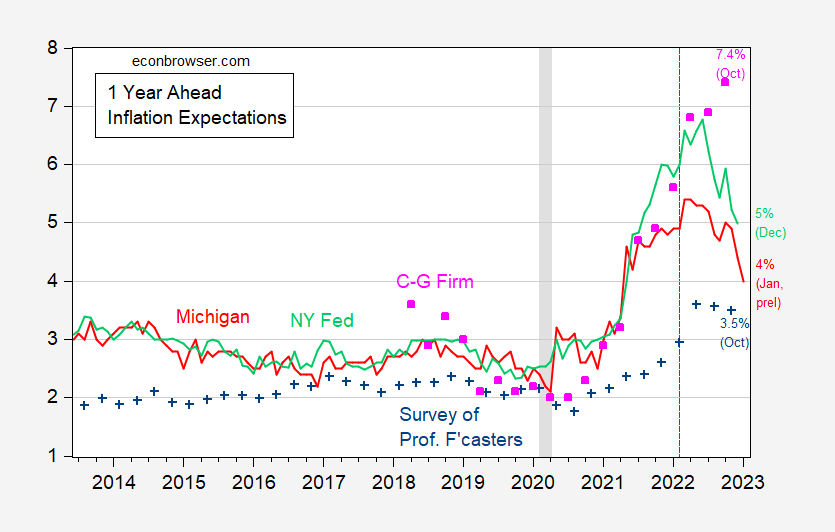
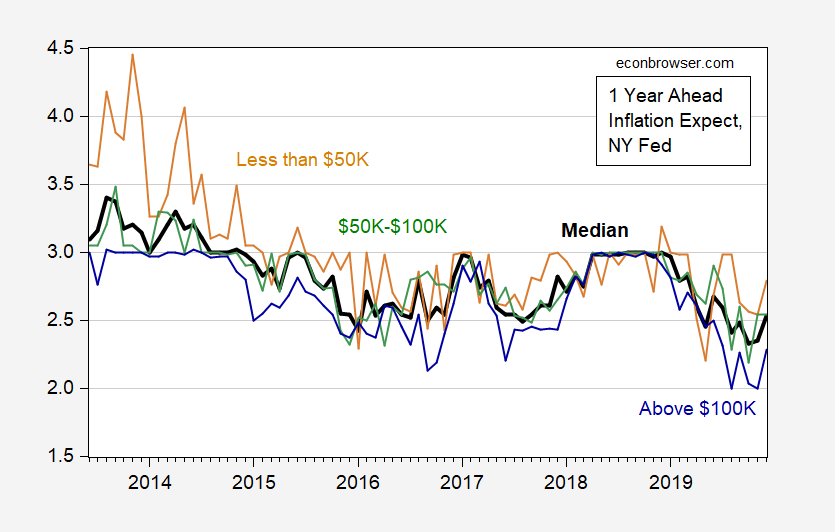
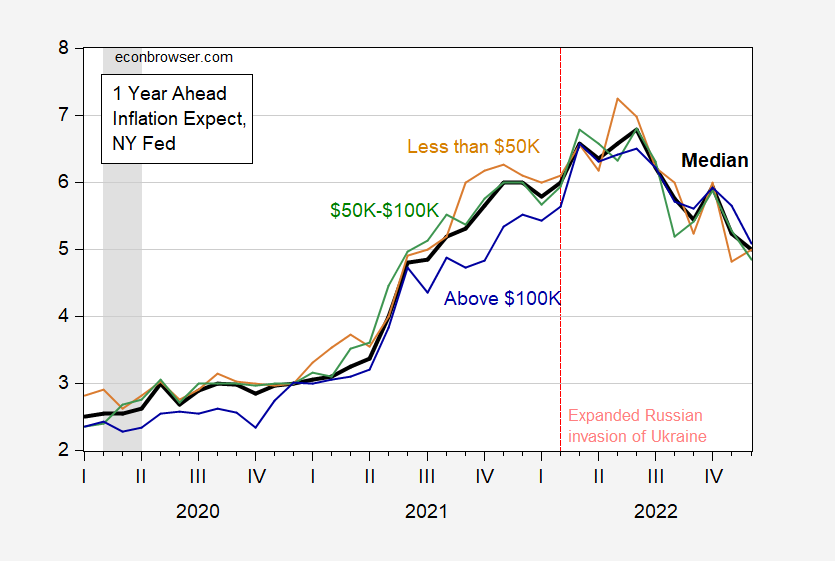
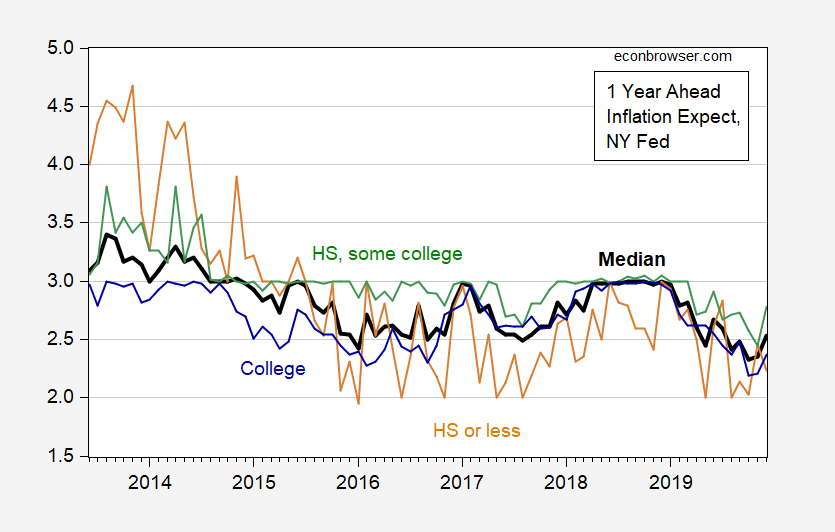
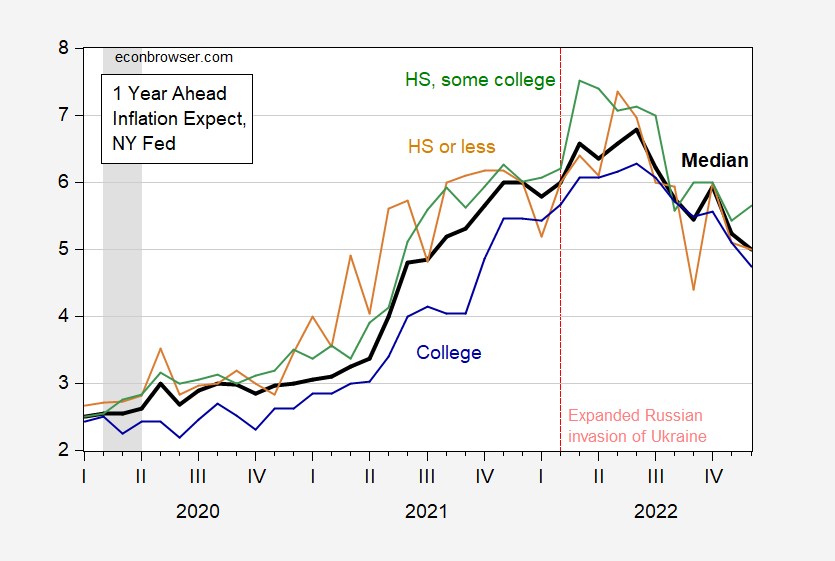
The last sentence in the last paragraph (the unlifted one) reads funny to me. It might be my error though.
If I was to put this in kind of simpleton terms, isn’t this kind of like saying “firms, or purchasing managers, (probably, truly or falsely, perceived as more ‘sophisticated’ than Wal Mart consumers), make the same mistake as Joe Sixpack, Joe Q Public, that when items they purchase (gasoline, or product inputs in the firms’ case) go up in price, that means in their own mind/perception prices are going up ‘for everyone’ or ‘in a wide array of product/commodity sectors’, even though maybe that isn’t the case.”
What would be more relevant to policy is to measure the accuracy of different cohorts’ expectations, particularly over time.
Why would this be? Oh wait – actual inflation (which is relevant) is not the same thing as expected inflation. OK maybe Jonny boy has this new super rational expectations model that he wants to mansplain to us. OK Jonny boy – please “educate” us.
“ Economists and economic policymakers believe that households’ and firms’ expectations of future inflation are a key determinant of actual inflation. A review of the relevant theoretical and empirical literature suggests that this belief rests on extremely shaky foundations, and a case is made that adhering to it uncritically could easily lead to serious policy errors”
https://www.federalreserve.gov/econres/feds/files/2021062pap.pdf
“ the correlation between [the CPI and consumer expectations of inflation] is negligible, about 0.08. (A reading of 1.0 indicates a perfect positive relationship between two variables, and 0.0 indicates no relationship.)”
https://www.stlouisfed.org/on-the-economy/2021/march/well-consumers-forecast-inflation
Maybe pgl, our resident genius, could explain why so many economists are so enamoured with massaging and using such worthless information.
Gee Jonny – your links are saying that consumers are not the best forecasters of inflation. A point Dr. Chinn has argued before and there was some troll named JohnH who tried to tell our host that consumers and firms were better at forecasting inflation than consumers. Now THIS JohnH seems to be calling the other JohnH a liar? OK!
BTW – economists are doing a somewhat better job at forecasting inflation. Your links do not refute that. Of course the pathetic little Jonny boy has no accused economists of being monkeys? Oh wait – that comment was referring to the Michigan survey which captures expectations by households not economists.
So little Jonny boy does not know what the eff he is babbling about. As I said – Jonny boy is dumber than your average monkey.
Totally ridiculous!!! I [ried to tell our host that consumers and firms were better at forecasting inflation than consumers?”
What I actually said is that polling those who set prices (corporate line manages) about their budgeted price increases would provide a lot better information than polling consumers about how much inflation Corporate America will foist on them.
JohnH
January 17, 2023 at 2:24 pm
JohnH and his ill-informed malleable opinions once again! I guess you were too stupid to notice how businesses were also inept at forecasting inflation. Then again – you are inept at counting past 10.
the correlation between [the CPI and consumer expectations of inflation] is negligible, about 0.08. ????
Jonny boy does not know the difference between CPI (price level) and its rate of change? Yea – you are as dumb on Bruce Hall.
Come on Jonny – the damn chart was clearly labeled CPI INFLATION and consumer expectations of inflation.
Learn to effing READ. DAMN!
Professional forecasters use data, predictive models and often judgment to make inflation forecasts. Perhaps not surprisingly, they have been found to perform better at forecasting inflation.
For more information, see Lloyd Thomas’ 1999 Journal of Economic Perspectives article “Survey Measures of Expected U.S. Inflation.”
Maybe Jonny boy should read this 1999 paper given his utter ignorance of this issue. Yea – professional forecasters do a better job of forecasting inflation, which likely angers Jonny boy since Jonny boy thinks his is so much smarter than economists. Jonny boy even makes some sick joke about economists being monkeys when it is Jonny boy who is being mocked by that pool of monkeys.
Has pgl looked at how bad the inflation forecasts have been over the last year? I provided a link to forecasts from a year ago. It was hilarious!
So if professional foreasters do a better job (but are still very inaccurate), why even bring consumer expectations into the mix, since it is even more inaccurate?
JohnH
January 17, 2023 at 2:33 pm
Jonny boy says he provided a link. WTF is it Jonny boy? Oh I bet if we saw it then your utter confusion would be even more exposed. For someone who does not know the difference between an economist, consumer, and monkeys NO ONE trust a word you say.
The first time JohnH linked to this paper by Jeremy B. Rudd, I suggested he actually READ it. I did then and I re-read it. Something tells me that Jonny boy has no clue what Rudd was saying. Then again Jonny boy never bothered to read Friedman or Phelps or even Lucas – whose models Rudd was discussing and trying to improve on.
Look Jonny boy does this a lot – tries to appear smarter than everyone else on a topic he never understood in the first place. Taking cherry picked quotes out of context from a thought provoking paper isn’t being smart. In fact – it is incredibly stupid.
Hey Jonny – I would ask you to sit down and take some serious time trying to understand what Rudd was actually saying. But we know you will not. You never do.
And what, pray tell, did pgl read that contradicted the abstract? Funny, he can’t manage to summarize anything that actually refutes it!
While I do appreciate the democratic process implicit in having consumers polled about their intuition and impressions of inflation, it boils down to asking the inattentive and ill-informed to opine about something that they don’t understand. Basically any poll relying on such data is no more than garbage in-garbage out. Little wonder that Rudd says that the relevance of consumer expectations rest on very shaky foundations! Their poor predictive power only proves the point. Yet economists insist on massaging and using data that is essentially garbage!
So, since we’re being democratic about economic forecasts, why not ask people what they think the traded weighted value of the dollar will be? Or the mortgage spread in one year’s time? Or, to make things even more entertaining and ridiculous, the price of hog bellies in six months.
Most likely, consumers could provide information as useful as inflation expectations for any number of forecasts!!!
“JohnH
January 17, 2023 at 2:18 pm
And what, pray tell, did pgl read that contradicted the abstract?”
So all Jonny boy was to read a two sentence abstract that said very little. I unlike you read the whole paper. Hey Jonny boy – you keep proving my point – you cannot read an entire paper and you cannot comprehend even 2 plus 2.
Here is something Jonny boy forgot to note:
Without a sophisticated model, consumers may guess what will happen tomorrow (or even one year from now) by assessing what is happening today.
Indeed, the correlation between the CPI inflation rate in a given month and consumer inflation expectations surveyed concurrently proves much stronger, at 0.64. A 2001 paper from Andrew Atkeson and Lee Ohanian refers to this forecasting framework as a naive model of inflation forecasting, and they use it as a benchmark by which to gauge other, more complex forecasting models.X
For more information, see Atkeson and Ohanian’s paper “Are Phillips Curves Useful for Forecasting Inflation?”
This framework appears to perform well during stretches of time where the inflation rate is less volatile. For instance, inflation stayed fairly constant in the mid-1990s, and consumer inflation forecasts tracked the actual CPI inflation rate pretty closely. Meanwhile, when inflation is more volatile, this framework appears to perform poorly.
So consumers forecasts are not that awful for periods that are not highly volatile. Yea – the current period was one where a lot of people (especially trolls like Bruce Hall) got things wrong but of course Jonny boy wanted us to believe all forecasting have no clue what they are doing. And yea – his own link contradicts that while noting another useful paper Jonny boy has not read.
To the grown ups here – my apologies for beating the dead horse that we call JohnH but he does make a lot of bogus claims as his grossly misrepresents who his own links have said.
We don’t talk sports much on this blog. Dallas is favored by 3 tonight over Tampa Bay. I think Dallas easily beats that spread. I think Tommy’s gas tank is running on empty. Any thoughts??
bucs done only18 at half….
wait til 00 in 4th qtr.
Bucs won the 2nd half 14-13. BFD. Brady is washed up.
5 TDs but only 1 extra point? But TV 12 got only 2 TDs. Blow out!
https://www.msn.com/en-us/sports/nfl/tom-brady-got-away-with-such-a-dirty-move-while-trying-to-tackle-a-cowboys-defender/ar-AA16qeHj
While trailing 24-0 in the third quarter of a Wild Card playoff matchup against the Dallas Cowboys, Buccaneers receiver Chris Godwin seemingly fumbled a nine-yard reception. During the ensuing return from Dallas safety Malik Hooker, which went for 19 yards, Brady attempted what can only be described as a slide tackle as he tried to trip up Hooker.
Nothing new from please don’t touch Tom Brady – he is a dirty player when he can get away with it. But maybe this is why they lost. Tom thought he was playing soccer.
The problem is the NFL is very inconsistent in making many calls. Everyone knows how they do pass interference (that and the inundation of commercials is why I don’t watch many games anymore). But “chop blocks” and “cut blocks” are one of the things you will see players get very very angry about (even more angry than most of them are about “targeting” calls) Now I was a big fan of Bill Walsh back in the ’80s and early ’90s. But if you go back, the 49ers were doing cut blocks all the time and it never got called. And you have to ask yourself two questions: “How do they cut block all the time if it is not being coached and encouraged during practices?? And “Why do the 49ers get away with cut blocks when no other teams are allowed to cut block all the time??” The reality is the NFL hierarchy wants certain teams to win because those teams sell more merch, have a wider fan base, it makes fans happy, and the NFL makes more money tilting the scales of officiating in games.
Glad you mentioned those 49ers who I abhorred even when I lived in SF. I may hate Brady but I hated Montana even more. Then again – I’m one of those die hard Falcon fans. So please do not remind me of 28-3.
Bad ownership can’t be cured—other than a sell-off. He treats the Falcons like a luxury wristwatch, something for other people to notice and admire and for him to largely ignore.
My two favorite quarterbacks: Montana and Brady. Oh, yes, 28-3.
“Steven Kopits
January 17, 2023 at 2:45 pm
My two favorite quarterbacks: Montana and Brady.”
Go figure – Stevie likes self centered people who whine all day when they take a teenie little hit.
Hey Stevie – how did your boy Brady do yesterday? Oh that’s right – better than your stupid forecasts. k
In my book, no one will ever compare to “the Punky QB”. Except maybe Kosar. Most underrated Jim Plunkett. Honorary mention, Steve DeBerg for greatest play-action fake hand offs of all time.
Menzie might appreciate the fact Kosar had a double major in economics and finance and graduated in 3 years instead of 4. That’s enough to make any “tiger mom” proud. A member of “the tribe” (HINT: Not the DC R*dskins).
P.S. never mind 28-3, greatest choke of ALL time?? Seahawks Super Bowl XLIX.